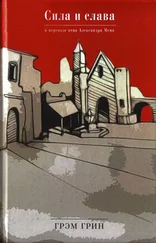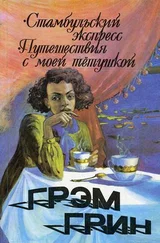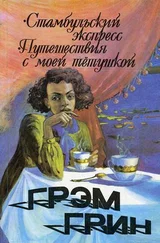Грэм Грин - The Comedians
Здесь есть возможность читать онлайн «Грэм Грин - The Comedians» весь текст электронной книги совершенно бесплатно (целиком полную версию без сокращений). В некоторых случаях можно слушать аудио, скачать через торрент в формате fb2 и присутствует краткое содержание. Год выпуска: 1966, Жанр: Классическая проза, на английском языке. Описание произведения, (предисловие) а так же отзывы посетителей доступны на портале библиотеки ЛибКат.
- Название:The Comedians
- Автор:
- Жанр:
- Год:1966
- ISBN:нет данных
- Рейтинг книги:3 / 5. Голосов: 1
-
Избранное:Добавить в избранное
- Отзывы:
-
Ваша оценка:
- 60
- 1
- 2
- 3
- 4
- 5
The Comedians: краткое содержание, описание и аннотация
Предлагаем к чтению аннотацию, описание, краткое содержание или предисловие (зависит от того, что написал сам автор книги «The Comedians»). Если вы не нашли необходимую информацию о книге — напишите в комментариях, мы постараемся отыскать её.
The Comedians — читать онлайн бесплатно полную книгу (весь текст) целиком
Ниже представлен текст книги, разбитый по страницам. Система сохранения места последней прочитанной страницы, позволяет с удобством читать онлайн бесплатно книгу «The Comedians», без необходимости каждый раз заново искать на чём Вы остановились. Поставьте закладку, и сможете в любой момент перейти на страницу, на которой закончили чтение.
Интервал:
Закладка:
Next day I was sent off with Joseph, as my guide to try to cross the Dominican frontier. My car and the bodies had been long discovered by now, and there was no safety for me anywhere in Haiti. They could spare Joseph easily because of his damaged hip, and he could fulfil at the same time a second function. Philipot planned that I was to slip over the international road, which divided the two republics for about fifty kilometres north of Banica. It was true that, every few kilometres on either side of the road, there were Haitian and Dominican guard-posts, but it was said, with what truth he wanted to find out, that the posts on the Haitian side were deserted at night for fear of a guerrilla attack. All peasants had been expelled from the border, but there was said to be still that party of about thirty men operating in the mountains with which Philipot wanted to make contact. Joseph's information would be of value if he got back, and he was more expendable than the others. I suppose, too, his lame walk was considered slow enough to enable a man of my age to keep up with him. The last words Jones said to me in private were, 'I'm going to keep it up, old man.'
'And the golf-club?'
'The golf-club's for old age. After we've taken Port-an-Prince.'
The journey was slow, rough and tiring and took us eleven days, nine days of lying up, of sudden dashes from one point to another, of doubling on our tracks, and finally two last days of imprudence because of hunger. I was glad enough when we came in sight at dusk, from our grey eroded mountain where nothing grew, of the deep Dominican forest. You could see all the twists of the frontier by the contrast between our bare rocks and their vegetation. It was the same mountain range, but the trees never crossed into the poor dry land of Haiti. Half-way down the slope was a Haitian guard-post — a collection of decrepit huts — and across the track a hundred yards from it was a castellated fort, like something from the Spanish Sahara. A little before dusk we saw the Haitian guards straggle out, leaving not one sentinel behind. We watched them go to God knows what hide-out (there were no roads or villages where they could escape the pitiless rock), then I said good-bye to Joseph, making some silly joke about rum punch, and scrambled down the track of a meagre stream on to the international road — a grand name for a track little better than the Great Southern Highway to Aux Cayes. Next morning the Dominicans put me on an army truck which came daily to the fort with supplies, and I landed in Santo Domingo in torn and dusty clothes, with a hundred unchangeable gourdes in my pocket and fifty American dollars comprised in a single note which I had sewn for safety into the lining of my pants. With the help of that note I took a room and a bath and cleaned myself up and slept for twelve hours before I went to beg for money at the British Consulate and for expatriation — to where?
It was Mr Smith who saved me from that humiliation. He happened to be driving by in Mr Fernandez's car and he saw me on the street as I tried to ask my way to the Consulate from a negro who only spoke Spanish. I wanted Mr Smith to drop me at the Consulate, but he would have none of it; all such matters, he said, could wait till after lunch, and when lunch was over he told me it was quite out of the question to borrow money from an unsympathetic consul since he, Mr Smith, was there with plenty of American Express dollars. 'Think what I owe you,' he said, but I could think of nothing that he owed me. He had paid his bill at the Hotel Trianon. He had even supplied his own Yeastrel. He appealed against me to Mr Fernandez and Mr Fernandez said, 'Yes,' and Mrs Smith remarked angrily that, if I thought her husband was the kind of man to let a friend down, then I should have been with them that day in Nashville … Waiting for him now, I thought what a continent of difference divided him from Mr Schuyler Wilson.
He was alone when he joined me in the lounge of the Ambassador. He apologized for the absence of Mrs Smith who was taking her third lesson in Spanish from Mr Fernandez. 'You should hear the two of them talking away together,' he said. 'Mrs Smith has a remarkable talent for languages.'
I told him how I had been received by Mr Schuyler Wilson. 'He assumed I was a Communist,' I said.
'Why?
'Because the Tontons were after me. Papa Doc, you remember, is a bulwark against Communism. And insurgent, of course, is a dirty word. I wonder how President Johnson would deal now with something like the French Resistance. That too was infiltrated (another dirty word) by the Communists. My mother was an insurgent — lucky I didn't tell Mr Schuyler Wilson that.'
'I don't see what harm a Communist could do as a catering manager.' Mr Smith looked at me with an expression of sadness. He said, 'It's not at all pleasant to feel ashamed of a fellow-countryman.'
'You must have experienced it often enough in Nashville.'
'That was different. There it was a disease, a fever. I could be sorry for them. In my state we still have a tradition of hospitality. When a man knocks on the door we don't ask him about his politics.'
'I'd hoped to be able to pay you back your loan.'
'I'm not a poor man, Mr Brown. There's plenty more where that came from. I suggest you take another thousand dollars now.'
'How can I? I have no security to offer you.'
'If that's what's worrying you, we'll draw up a paper — quite fair and legal, and I'll take a mortgage on your hotel. After all it's a fine property.'
'It's not worth a nickel now, Mr Smith. The Government has probably taken it over.'
'Things will change one day.'
'I've heard of another job in the north. Near Monte Cristi. As canteen manager for a fruit company.'
'You don't have to fall as low as that, Mr Brown.'
'I've fallen a lot lower than that in my time and less respectably. If you don't mind my using your name again … This is an American company too.'
'Mr Fernandez was telling me that he needs an Anglo-Saxon partner. It's a fine prosperous little business he has here.'
'I've never thought of becoming an undertaker.'
'It's a valuable social service, Mr Brown. And there's security too. No business recessions.'
'I'll try the canteen first. I've more experience there. If that fails, who knows …?'
'Did you know Mrs Pineda was in town?'
'Mrs Pineda?'
'That charming lady who came up to the hotel. Surely you remember her?'
For a moment I really hadn't known whom he meant. 'What's she doing in Santo Domingo?'
'Her husband has been transferred to Lima. She's staying a few days here at her embassy with her little boy. I forget his name.'
'Angel.'
'That's right. A fine boy. Mrs Smith and I are very fond of children. Perhaps because we never had any of our own. Mrs Pineda was glad to hear you'd come out of Haiti in one piece, but she was naturally anxious about Major Jones. I thought we might all have a little dinner together tomorrow night and you could tell her the story.'
'I'm planning to go north tomorrow early,' I said. 'Jobs can't wait. I've been hanging around here long enough. Tell her I'll write to her all I know about Jones.'
3
I had a jeep to withstand the road on this occasion, arranged for me again at a cut-price by Mr Fernandez. Nevertheless I was not to reach Monte Cristi and the banana plantations, and I shall never know whether I would have proved acceptable as a canteen manager. I set off at six in the morning and reached San Juan by breakfast-time. There was a good road as far as Elias Pinas, but then along the frontier, perhaps because there was no traffic except the daily bus and a few military camions, the international road was more suitable for mules and cows. I had reached the military post of Pedro Santana when I was stopped — I didn't understand why. The lieutenant, whom I knew by sight because I had met him a month ago when I came over the frontier, was busy talking to a fat man in city-clothes; he was being shown a lot of glittering junk-jewellery, necklaces, bracelets, watches, rings — the frontier was a happy hunting-ground for smugglers. Money changed hands and the lieutenant came to my jeep.
Читать дальшеИнтервал:
Закладка:
Похожие книги на «The Comedians»
Представляем Вашему вниманию похожие книги на «The Comedians» списком для выбора. Мы отобрали схожую по названию и смыслу литературу в надежде предоставить читателям больше вариантов отыскать новые, интересные, ещё непрочитанные произведения.
Обсуждение, отзывы о книге «The Comedians» и просто собственные мнения читателей. Оставьте ваши комментарии, напишите, что Вы думаете о произведении, его смысле или главных героях. Укажите что конкретно понравилось, а что нет, и почему Вы так считаете.



